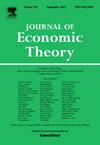对普通商品多单位拍卖的低效率进行量化
IF 1.2
3区 经济学
Q3 ECONOMICS
引用次数: 0
摘要
我们研究了私有价值环境下同质商品的多单位拍卖,其中竞标者有多单位需求和非负财富效应。当竞标者具有拟线性偏好时,维克里拍卖在优势策略下实现了有效的结果。当竞标者具有积极的财富效应时,最近的不可能性结果发现,没有一场拍卖能实现有效的结果。我们量化了维克里拍卖和其他多单位拍卖在投标人具有积极财富效应时的最坏情况下的低效率。我们将拍卖的最坏情况下的低效率衡量为与任何帕累托改进相关的最大补偿变化。我们表明,当竞标者财富效应的强度足够小时,维克里拍卖是“接近”有效的。之所以会出现这种结果,是因为随着竞标者财富效应变小,维克里拍卖会上的非主导竞价组瓦解,无法如实报告需求。我们还比较了维克里拍卖与统一价格和歧视性拍卖的最坏情况下的低效率。本文章由计算机程序翻译,如有差异,请以英文原文为准。
Quantifying the inefficiency of multi-unit auctions for normal goods
We study multi-unit auctions for homogeneous goods in a private-value setting where bidders have multi-unit demand and non-negative wealth effects. When bidders have quasilinear preferences, the Vickrey auction implements an efficient outcome in dominant strategies. When bidders have positive wealth effects, recent impossibility results find that no auction implements an efficient outcome.
We quantify the worst-case inefficiency of the Vickrey auction and other multi-unit auctions when bidders have positive wealth effects. We measure an auction's worst-case inefficiency as the largest compensating variation associated with any Pareto improvement over an undominated auction outcome. We show that the Vickrey auction is ‘nearly’ efficient when the strength of bidder wealth effects is sufficiently small. This result follows because the set of undominated bids in the Vickrey auction collapses to truthfully reporting demand as bidder wealth effects become small. We also compare the worst-case inefficiency of the Vickrey auction with that of the uniform-price and discriminatory auctions.
求助全文
通过发布文献求助,成功后即可免费获取论文全文。
去求助
来源期刊

Journal of Economic Theory
ECONOMICS-
CiteScore
2.50
自引率
12.50%
发文量
135
期刊介绍:
The Journal of Economic Theory publishes original research on economic theory and emphasizes the theoretical analysis of economic models, including the study of related mathematical techniques. JET is the leading journal in economic theory. It is also one of nine core journals in all of economics. Among these journals, the Journal of Economic Theory ranks fourth in impact-adjusted citations.
 求助内容:
求助内容: 应助结果提醒方式:
应助结果提醒方式:


